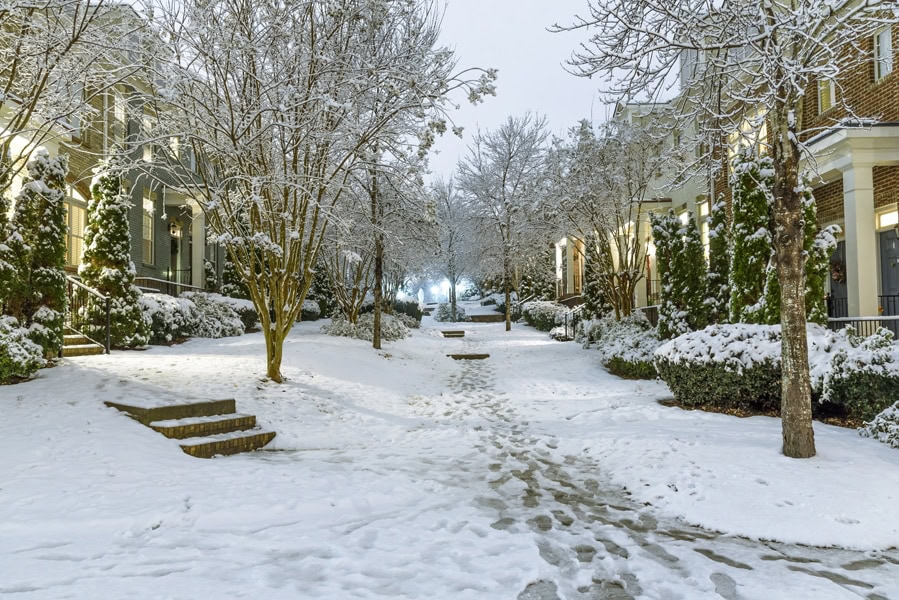Prepping Your Pipes For Winter

Imagine this winter, sitting in your Salem home by the fire, looking out the window at the falling snowflakes while sipping your hot cocoa with marshmallows. Life is good. It is good, that is, until you hear the loud rush of water somewhere in your Oregon home.
You have got burst pipes.
Pipes Down!
Unfortunately, this scenario is all too common here in Salem despite it being easily preventable. In fact, burst frozen pipes are so prevalent, the US Department of Energy (DOE) Office of Energy Efficiency and Renewable Energy (EERE) has a map showing the probability of frozen pipes in different US geographical regions.
Before the temperatures dip below 32 degrees Fahrenheit on the thermometer, follow the plumbing-prep recommendations from our Gagle’s Heating professionals, and you will be on your way to ensuring life stays good.
Where and How to Do What
Before the cold sets in, follow our tips with your plumbing components, and they should make it through the Oregon winter like a champ, preventing you costly repairs and aggravating headaches:
• Outdoor spigots (also called hose bibbs). Well before the first freeze of the season, bleed your outdoor spigots of any residual water. Then shut the water off.
Even though these spigots are outdoors, if they burst, your whole house suffers. In the event you have outdoor pipes you can’t shut off, insulate them with a foam dome cover, heat tape, or consider having our plumbers replace them with frost-free models. You should be able to find the cover and tape at most do-it-yourself (DIY) and hardware stores.
• Pipes/plumbing in unheated areas (such as crawl spaces or garages) or near exterior walls.
Burst pipes in walls are both very messy and expensive. Note: This issue is particularly troublesome for mobile homes.
Wrap any exposed pipes with pipe insulation or heat tape. And if possible, try to add insulation or extra insulation to the exterior walls to help protect those pipes.
• All indoor plumbing. During especially cold nights, consider keeping your room-temperature water running from all your faucets (including showers/bathtubs) throughout the night. Keep it flowing at just above a trickle.
Opening your cabinet doors to expose your pipes to the house warmth can additionally help. This trick is highly recommended for any bathrooms with plumbing located in exterior walls. If your pipes have a history of freezing in a bathroom, try adding a space heater to the process. Warning: Always monitor space heater use.
• Pipes with existing leaks. Any existing leaks you may have, no matter how small, need to be repaired before the colder temps. A deep freeze can turn the smallest leak into a large rupture.
• Water heater. Have your water heater checked and flushed before winter sets in. Sediment is constantly slowly building, so having your heater drained and flushed can ensure you will have hot water during the coldest months. It may even be a good idea to schedule your annual plumbing inspection for the same time to alert you to any other issues you may have.
• Well pump. If you have a well pump, you need to take steps to insulate it to prevent frozen or burst pipes. The best scenario is to have a well house or permanent covering for it. Even with the housing, you may need to keep a small amount of water continuously running when very low temperatures set in.
If your pump has a well cover, open the cover and lay a sheet of insulation around the well head and plumbing. Replace the cover, and check that air can’t blow in.
Be sure to call our highly trained and experienced Gagle’s Heating plumbers for assistance, or simply for any advice, when it comes to the well-being of your well.
• Sump pump. Check your sump pump to be sure it is working correctly. You want to check to be sure it is clean and everything is draining properly, as in no clogs. You can pour water into the pit yourself to check the drainage.
Also be certain to check and test your sump pump backup mechanism.
• Entire house when traveling. When leaving for an extended time, your first inclination may be to turn your heat way down to save energy. But your plumbing needs your furnace to remain at a minimum of 55 degrees Fahrenheit to help keep your pipes from freezing.
Consult our plumbers to discuss the possibility of turning off all the water while you are away, as this option has both pros and cons.
Let Us Help You Prep Your Plumbing for Winter
Taking the time to prep your home’s plumbing for the winter will give you peace of mind. This is the kind of peace that comes with knowing you will be spending your money on the things you want––like cocoa and marshmallows––and not on unexpected and costly plumbing repairs.
Call our Gagle’s Heating plumbers at 503-581-2972 or request service online to assist you in winterizing your Salem, OR home’s plumbing today.
